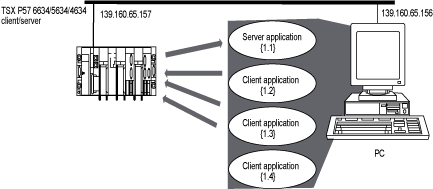Depending on the
connection configuration of the Ethernet channel of the
TSX P57 6634/5634/4634, you can carry out messaging.
-
in mono-connection
-
in multi-connection
According to the type of protocol and access control management, multi-connection mode requires a specific configuration of the correspondence table.
NOTE: In the following, only examples of multi-connection are shown. Furthermore, emphasis is placed on communications between the coprocessor and a remote PC device containing several applications.
Several connections can be configured with the same IP address. They must be defined with the same protocol, the same access rights, and the same connection mode.
In the case of a Modbus connection, only two connections can be configured with the same IP address. Addresses associated with these connections are:
Multi-Connection in UNI-TE Protocol with Access Management
In this example, the PC contains four applications with a unique X-Way address and one single IP address:
-
The coprocessor opens a connection and communicates with the address server application {1.1}.
-
Each of the other client applications with the address {1.2}, {1.3}, {1.4} is authorized to open a connection and communicate with the coprocessor.
Exchanges are carried out according to the UNI-TE protocol when the coprocessor's access control utility is enabled.
In order to implement this example, you must:
-
activate connection management by checking the coprocessor's Access control box
-
configure communication from the coprocessor to the PC’s server application in the table
-
configure communication of each of the PC’s client applications to the server coprocessor in the table:
-
X-Way address: 1.2 and 1.3 and 1.4
-
IP address: 139.160.65.156
-
Access: authorized (cell checked)
-
Mode: multi
Multi-Connection in UNI-TE Protocol without Access Management
This example is the same as the previous one, except that access control is not configured.
In this case, if the application {1.1} is the only server application, the coprocessor's correspondence table only contains the following line:
Multi-Connection in Modbus Protocol with Access Management
In this example, the PC contains four applications. The server application has an imaginary X-Way address and the other client applications do not need an X-Way address:
-
The coprocessor opens a connection and communicates with the server application with the imaginary address {1.103}.
-
Each client application has no address but is authorized to open a connection and communicate with the Ethernet channel of the TSX P57 5634/4634.
Exchanges are carried out according to the Modbus protocol when the coprocessor's access control utility is enabled.
In order to implement this example, you must:
-
activate connection management by checking the coprocessor's Access control box
-
configure communication from the coprocessor to the PC’s server application in the table
-
X-Way address: 1.103 (address between 100 and 163 for the Modbus protocol)
-
IP address: 139.160.65.156
-
Access: the cell is grayed out
-
Mode: multi
-
configure communication of all of the PC’s client applications to the server coprocessor in the table:
NOTE: If you want to prevent connection by client applications you must configure
Multi-Connection in Modbus Protocol without Access Management
This example is the same as the previous one, except that access control is not configured.
In this case (where the application {1.103} is the only server application), the coprocessor's correspondence table only contains the following line:
-
X-Way address: 1.103 (address between 100 and 163 for the Modbus protocol)
-
IP address: 139.160.65.156
-
Access: the cell is grayed out
-
Mode: multi

